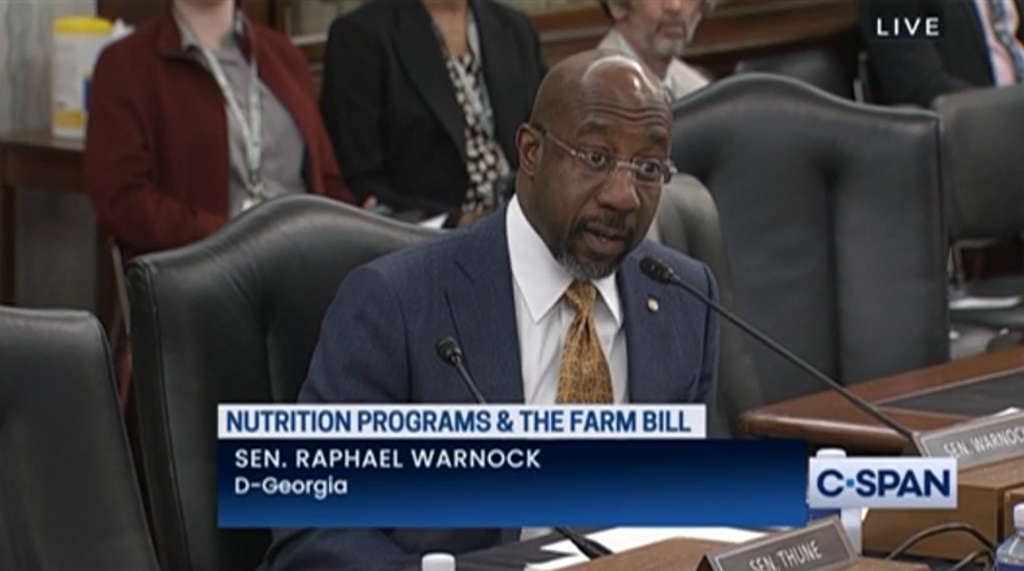During today’s Senate Agriculture Committee hearing, Senator Reverend Warnock affirmed the need to strengthen access to nutrition, especially for children, in the 2023 Farm Bill and reiterated his focus on the issue as the Senate prepares to reauthorize key federal nutrition programs
Senator Reverend Warnock, who was arrested in the United States Capitol’s Russell Rotunda protesting nutrition cuts to the 2018 Farm Bill, now sits on the Agriculture committee tasked with drafting the 2023 Farm Bill
Senator Reverend Warnock also highlighted a story from a Georgian named Nia, a disabled mother of four who survives on federal nutrition assistance, who told the Senator that her monthly food budget is only lasting her about two weeks
Senator Reverend Warnock: “…it’s always the moral question in how do we center the concerns of ordinary people like Nia, which it occurs to me is Swahili for “purpose,” what is our purpose in this moment? And I think it is to do justice, to love mercy, and to walk humbly with our God.”

WATCH: The Senator’s full remarks at today’s Agriculture committee hearing
Washington D.C. — Today, U.S. Senator Reverend Raphael Warnock (D-GA), a member of the United States Senate Committee on Agriculture, Nutrition, and Forestry, centered the needs of Georgians who rely on nutrition assistance at a hearing examining federal nutrition programs authorized in the 2023 Farm Bill. Senator Warnock opened his remarks by discussing his 2017 arrest in the Russell Rotunda of the United States Capitol after protesting against cuts to nutrition benefits in the Farm Bill. The Senator then highlighted the story of Nia, a disabled mother of four from Dallas, Georgia, who wrote to the Senator explaining that her monthly grocery budget was now only lasting her two weeks. In the letter, Nia wrote, “It’s hard to tell your kid that mommy can’t buy that this month. It costs too much.” Watch the Senator’s full remarks HERE.
“This idea of children being hungry, in the wealthiest nation on the planet, for me, speaks to the heart of the gospel that I try to preach and embody every week,” said Senator Reverend Warnock.“I’m a Matthew 25 Christian; Jesus said, ‘inasmuch as you’ve done it unto the least of these, you’ve done it also unto me.’ So I think, for me, it’s always the moral question in how do we center the concerns of ordinary people like Nia, which it occurs to me is Swahili for “purpose,” what is our purpose in this moment? And I think it is to do justice, to love mercy, and to walk humbly with our God.”
During the hearing, the Senator questioned U.S. Department of Agriculture Deputy Under Secretary for Food, Nutrition, and Consumer Services Stacy Dean about the federal law that denies food assistance to returning citizens who were previously convicted of a drug-related felony. This includes non-violent offenders and those who have completed their prison sentence. In Georgia, people with drug felony convictions are required to comply with all of their probation or parole requirements to receive nutrition assistance. In response to the Senator’s questions, Deputy Under Secretary Dean confirmed that denying food to returning citizens undermines the goal of preventing recidivism and improving public safety.
Watch video of the Senator’s full remarks HERE.
Read key excerpts of the Senator’s remarks below:
“I’m struck just by the reality of my sitting here. Five years ago, when the Farm Bill was reauthorized as it is every five years, I was actually here, but I was outside, protesting and dealing with the issue of food insecurity in the spirit of Martin Luther King Jr., in whose pulpit I still preach, in an act of civil disobedience. I actually got arrested protesting some of the cuts around food insecurity in the Farm Bill. And it’s good to be here, and to have a voice, and to be sitting at the table to help write the bill.”
“When I think about the urgency of our work, think about those times and this time, I think about Nia from Dallas, Georgia. She’s a disabled mother of four on food stamps who wrote into my office last year asking for Congress to increase funding for nutrition programs. She said, ‘what I would usually spend for a month of food only lasts about two weeks. It’s hard to tell a kid- to tell your kid- that Mommy can’t buy that this month. It costs too much.’ This idea of children being hungry, in the wealthiest nation on the planet, for me, speaks to the heart of the gospel that I try to preach and embody every week. I’m a Matthew 25 Christian; Jesus said, ‘inasmuch as you’ve done it unto the least of these, you’ve done it also unto me.’ So I think, for me, it’s always the moral question in how do we center the concerns of ordinary people like Nia, which it occurs to me is Swahili for ‘purpose,’ what is our purpose in this moment? And I think it is to do justice, to love mercy, and to walk humbly with our God.”
###